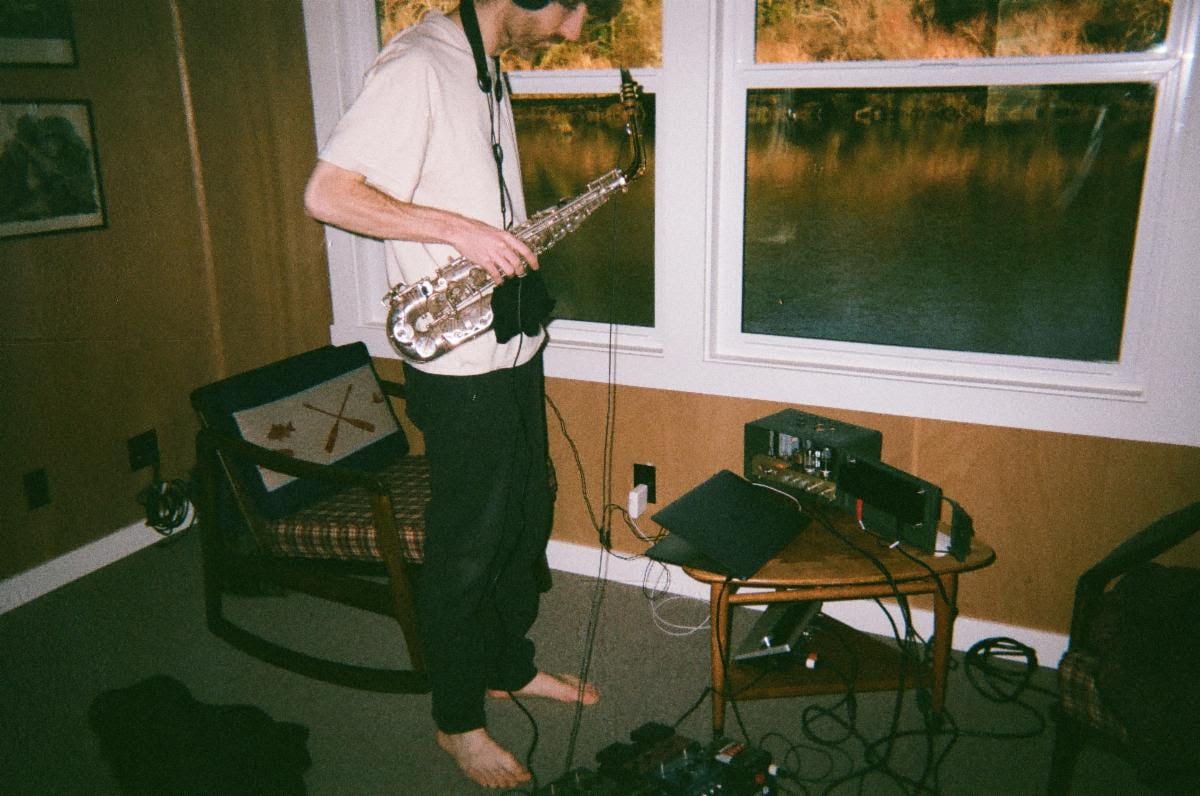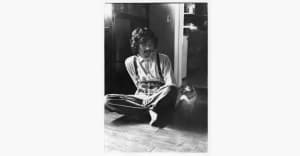Sam Gendel treads his own path
We spoke with the composer about crafting behemoth albums, his unexpected love of YouTube vlogs, and the time he found himself performing for 50,000 Red Hot Chili Peppers fans in Milan.

To be a fan of Sam Gendel is to give yourself over to a relentless wave of music. The 35-year-old Los Angeles-based saxophonist released his latest album Superstore last month and its title reflects its comprehensive nature: chances are you will find what you need in at least one of its 34 tracks.
Compared to last year’s 52-song, 224-minute epic Fresh Bread, however, it’s positively novella-like in its brevity. In total Gendel has released nine albums since the start of 2021, with Superstore following the curious Live A Little, an experimental pop album he made in collaboration with his 12-year-old sister-in-law Antonia Cytrynowicz. Prior to this he released Satin Doll, an album of jazz standards reworked through a psychedelic hip-hop lens, and performed live as part of both Moses Sumney and Perfume Genius’s band. Since this interview he has announced blueblue, another solo full-length due on October 14.
If Gendel’s place in the musical landscape feels hard to pin down then Superstore doesn’t want to provide many helpful location details. It’s a fascinating and loose set of ideas that sprout and dissipate at will, boasting a singular ambiance and a beat tape-like approach to structure and length. In conversation, Gendel stays true to this unknowable image, seemingly in love with music and yet alienated from it at the same time. He grew up listening to jazz but isn’t keen on being labeled a jazz musician while efforts to pin him down on specific rap influences fall by the wayside.
During our hour-long conversation, though, a couple of things become clear. Gendel is truly following his own path and doesn’t feel any pressure to work in anything like traditional methods. Whether we are talking about his feelings about the current health of the jazz world (he’s not a fan) or the idea of following his experimental peers into Hollywood and scoring a movie, he remains unmoved. “I just hate middlemen,” he says at one point, in relation to his fear of movie producers. That absence of outside influence is key to Gendel and his music.
There is no music industry guidebook that would advise you to release an album longer than two Marvel movies, nor that improvising a full album with a child will reap great rewards. It’s only by shunning outside voices that he can be left to let his voice come through untarnished or misshapen. It’s to his credit that his work rarely, if ever, feels indulgent or self-satisfied. More like a real-time pursuit of ideas and what feels exciting in the moment. Superstore, in that regard, is an ironic title. Gendel knows that what he’s selling isn’t for mass distribution.
THE FADER: How do you go about putting together a 34-track album like Superstore?
It’s pretty simple. If I finish a piece of music it naturally has its shape or form and aggregate things as they inform me where they want to be. This batch of music all relates, in some way, to my ears. I end up dragging them into one folder and at some point, it feels like that’s the statement and it’s done.
When do you know an album is done?
That’s the part that is hard to predict. You would think that you could do that endlessly but I eventually wake up one day and say, ‘OK. Enough is enough' and put the kibosh on it. You stop following the ideas after a certain point.
Would you ever consider ditching the album format and just having something like a playlist that you update with new music?
My girlfriend and I watch a lot of vlogs as a sort of cultural study, it seems, and that process you describe is more akin to their way of working. You’re constantly creating in a symbiotic relationship with whoever is consuming it. Music might get to that point. It already is for some people, I guess. Eventually, everyone will have their own channel and it’ll be the TV of humanity. You’ll either be making playlists or just have drones flying around you filming you 24 hours a day, endlessly streaming your life. I still like the album form though. I wouldn’t do it if I didn’t like it but if something else comes along then I’m down for it.
Do you have people around you trying in vain to put you on a more traditional path?
Anyone who had an interest in that gave up a long time ago. It ain’t gonna happen. I’m more interested in throwing ideas out and seeing where the ceiling is. I haven’t hit it yet. Putting out a “normal” album just doesn’t work for me, if it did I’d be doing it. There’s such a limited way of looking at humans sharing things. It’s all made up! I just do what naturally comes to my mind. I don’t have the fear anymore. I just do it and say, ‘This is the thing.’ Luckily people understand and are down to help me achieve that.
Even the greatest jazz musicians in history would say, ‘it’s either good or it’s not.’ That still applies, especially in this age of music. Right now I’m much more drawn to the things I don’t understand
You mentioned vlogs earlier, have you comes across your music on TikTok at all?
No. I wouldn’t know, I hate TikTok and wish it would go away. On the vlogs though they all use this royalty-free music licensing service called Epidemic Sound. It’s the funniest thing ever. We talk about trolling it and uploading some music to see if any vloggers use it. Over time, though, the music is getting more and more similar to regular pop productions. They sound like they take so much time to make and they’re uploading them to a platform for vloggers to use for free. It’s kind of insane to see the convergence of things and the way the goal now is to have your music used for something. I don’t relate but it’s amazing to watch.
One of the main things that attracted me to your music was picking up on a sense of humor in some of the songs and, particularly, in the videos. How important is humor to what you do?
As soon as I open my mouth I feel like I’ll fall short here but what you just said means a lot to me. I just don’t know how to speak because, as soon as I do, it’s over.
What is your relationship to jazz at this stage? You’ve released albums through traditional labels like Nonesuch but I’ve also seen interviews where you have distanced yourself from the genre tag. Do you mind when people call you a jazz artist?
I guess it’s just another part of the history of music. I got caught by jazz at an early age so it’s where I was led by my mind and my ear. It just happened outside of my understanding, it just happened. Jazz is just a language within another broader language. I’m a curious person and music offers up endless possibilities for me. I guess I can’t escape jazz. It’s what hits people first and they hear what they hear. I hope people stop thinking that way. You either like it or you don’t. Even the greatest jazz musicians in history would say, ‘it’s either good or it’s not.’ That still applies, especially in this age of music. Right now I’m much more drawn to the things I don’t understand. I don’t need to hear endless saxophone solos these days.
This album and your last record, Fresh Bread, play a lot like a rap producer’s beat tape. What’s your relationship to hip-hop? Was it big for you growing up?
I listen to a lot of rap and have done for decades. It’s just like jazz, it’s another dialect that I was drawn to from a young age. Whatever tools you get from being immersed in that becomes a part of your vocabulary. There’s no real specific ideas there, though. It’s just what hits my brain and ends up happening. I really don’t know how things find their way into my brain. It’s a big mystery to me.
Last year your song “BOA,” which you released alongside Sam Wilkes, was used prominently in the Netflix movie Malcolm & Marie. How did it feel to have your music recontextualised in that way?
I’m all for it. I think it was cool, and I like what they did with it. It was not what I expected would ever happen with that song but I was very grateful. Any time someone enjoys listening to my music I think, ‘Woah, that’s crazy.’ I truly have no idea how they found “BOA” but they approached me and explained how it would be used and I thought it sounded interesting.
Do you have any ambition to work in film or TV? Lots of musicians are hired to score movies now…
I could not see someone who makes movies or television hiring someone like me. The little I have seen of that world it seems that you have to be ready for that. They don’t have to be ready for you, you have to be ready for them. That’s cool but it takes a certain kind of person and that’s not me. I would do something with a singular vision, where it’s clear that my music is the inevitable endpoint for the project. That kind of unique experience is the only way it could happen and I don’t anticipate it happening at all.
When I was doing some research for this interview I saw that you once opened for Red Hot Chili Peppers with your former band, Knower. What are your memories of being on the road with those guys?
It was so funny. We played for 50,000 people in Rome and Milan. That kind of stuff doesn’t phase me, though. If there are that many people in front of you there may as well be none. It’s just a sea of heads. With that crew we just go wild, I was losing my voice every night screaming into my sax. We just didn’t care at all. Our experience is so intimate, those shows felt like we were rehearsing at home.
It was crazy too, because I had to fly to L.A. to play a festival show with Moses Sumney. I literally flew from Italy to L.A., played a show, and then flew straight back. It was totally psychotic. I was there for 12 hours, turned around and flew back.
You have a pretty busy schedule of festival dates coming up this summer. What’s your live show like right now?
I don’t play live very much, I just play with other people. That’s how I prefer it. I dread playing solo shows right up until I get on stage. For some reason performing has lost its luster for me, I’m much more content making music at home I like the slowness of that. Once I’m in the middle of a show, though, I’m all in. I just get debilitatingly nervous beforehand. I don’t know why.
The live show will always be new stuff, though. There are older things I’ll touch on but I’ll do them in a way based on the current mindset. That’s the only way I know how.
